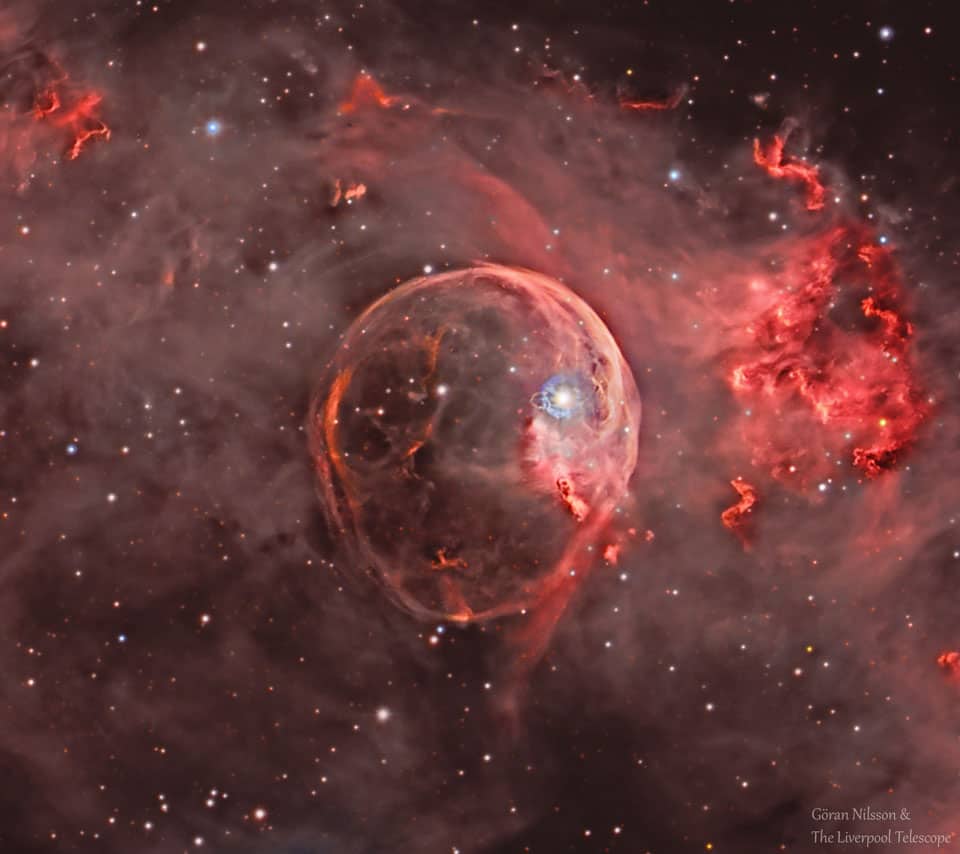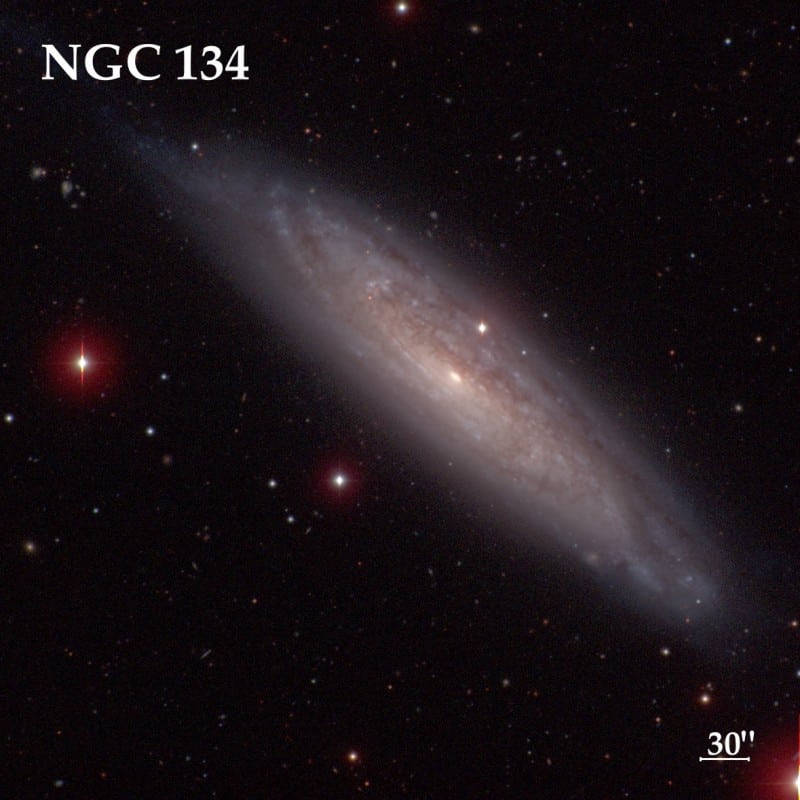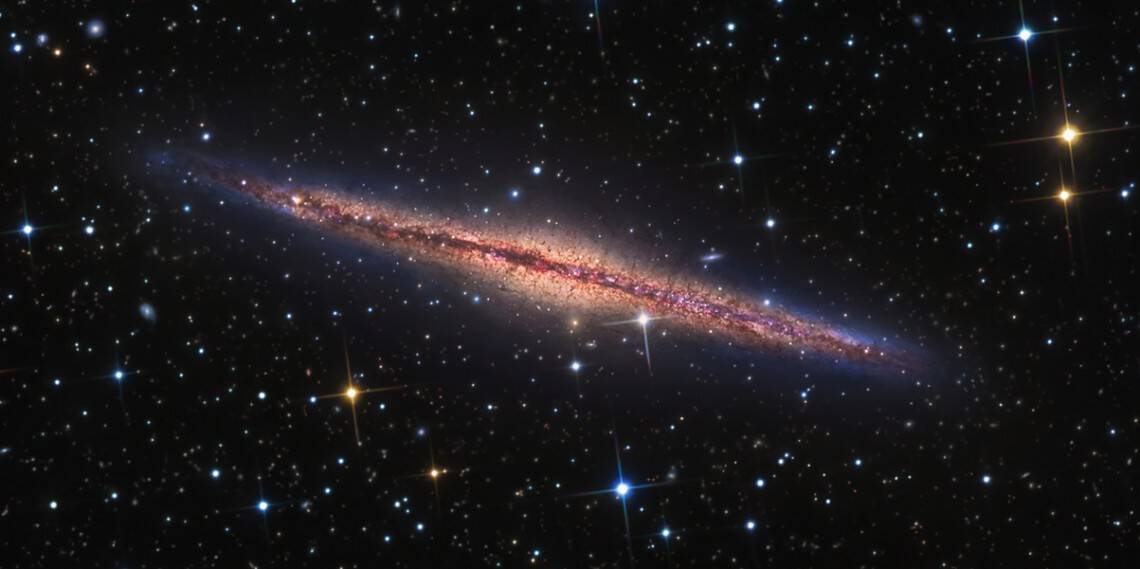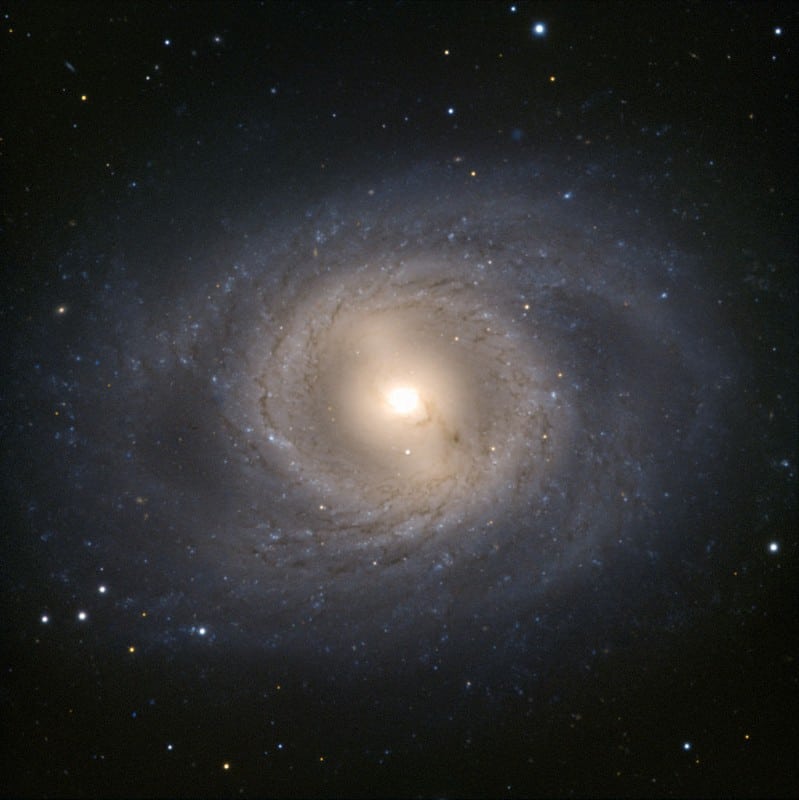Blog
The Cosmos with NGC 7635
It’s the bubble versus the cloud. NGC 7635, the Bubble Nebula, is being pushed out by the stellar wind of massive star BD+602522, visible in blue toward the right, inside the nebula. Next door, though, lives a giant molecular cloud, visible to the far right in red. At this place in space, an irresistible force meets an immovable object in an interesting way. The cloud is able to contain the expansion of the bubble gas, but gets blasted by the hot radiation from the bubble‘s central star. The radiation heats up dense regions of the molecular cloud causing it to glow. The Bubble Nebula, pictured here is about 10 light-years across and part of a muchlarger complex of stars and shells. The Bubble Nebula can be seen with a small telescope towards the constellation of the Queen of Aethiopia (Cassiopeia).
Al Kooper Day
Al Kooper (born Alan Peter Kuperschmidt, February 5, 1944) is an American songwriter, record producer and musician, known for organizing Blood, Sweat & Tears (although he did not stay with the group long enough to share its popularity), providing studio support for Bob Dylan when he went electric in 1965, and bringing together guitarists Mike Bloomfield and Stephen Stills to record the Super Session album. He has had a successful solo career since then, written music for film soundtracks, and has lectured in musical composition. He continues to perform live.
Kooper, born in Brooklyn, grew up in a Jewish family in Hollis Hills, Queens, New York. His first professional work was as a 14-year-old guitarist in the Royal Teens, best known for their 1958 ABC Records novelty 12-bar blues riff, “Short Shorts” (although Kooper did not play on the recording). In 1960, he teamed up with songwriters Bob Brass and Irwin Levine to write and record demos for Sea-Lark Music Publishing. The trio’s biggest hits were “This Diamond Ring“, recorded by Gary Lewis and the Playboys, and “I Must Be Seeing Things“, recorded by Gene Pitney (both 1965). When he was 21, Kooper moved to Greenwich Village.
more...Rick Laird Day
Richard Quentin “Rick” Laird is a jazz musician, born on 5 February 1941. He is a bass player best known for his place in the Mahavishnu Orchestra.
Born in Dublin, Ireland, Laird played music from a young age and enrolled for guitar and piano lessons. He started playing jazz after moving to New Zealand at the age of 16 with his father. He played guitar in jam bands in New Zealand before buying an upright bass. After extensive touring in New Zealand he moved to Sydney, Australia, where he played with many top jazz musicians including Don Burrows.
https://www.youtube.com/watch?v=yTPTI38yWX0
more...Wyatt Ruther Day
Wyatt Robert “Bull” Ruther (February 5, 1923, Pittsburgh – October 31, 1999, San Francisco) was an American jazz double-bassist.
Ruther played trombone in high school before picking up the double-bass. He studied at the San Francisco Conservatory of Music and the Pittsburgh Musical Institute, then played in New York City with Dave Brubeck (1951–52) and Erroll Garner (1951-55). He toured with Lena Horne in 1953 and recorded an album under his own name alongside Milt Hinton in 1955 for RCA Records entitled Basses Loaded. Following this he played with Toshiko Akiyoshi in 1956, then studied at the Royal Conservatory of Music in Toronto, Canada. While in Canada he played with the Canadian Jazz Quartet (1956–57) and Peter Appleyard (1957). He played in the U.S. during the same period with Ray Bryant, Zoot Sims, Bob Brookmeyer, and Chico Hamilton. He toured with George Shearing in 1959 and then played on a world tour with Buddy Rich in 1960-61. In 1962-63 he played in Gerry Mulligan‘s quartet, then joined Count Basie in 1964-65.
more...Daily Roots with Stranger Cole & Gladstone Anderson
2-5-18
https://www.youtube.com/watch?v=KKwzgf0X7R8
more...The Cosmos with NGC 134
NGC 134 is a barred spiral galaxy that resembles the Milky Way with its spiral arms loosely wrapped around a bright, bar-shaped central region. Its loosely bound spiral arms categorize it as Hubble-type Sbc. It is 60 million light years away, and part of the Sculptor constellation.
The VLT image of the galaxy (shown right) reveals the following. A prominent feature of NGC 134 is its warped disc, i.e., when viewed sideways it does not appear flat. A trail of gas is stripped from the top edge of the disc. Together, these features suggest that it interacted with another galaxy, but that remains unproven. The galaxy has an abundance of ionized hydrogen regions along its spiral arms where stars are forming. These regions appear red in the picture. It also has many dark lanes of dust that occlude its complete starlight.
The discovery of NGC 134 is often attributed to Sir John Herschel at the Cape of Good Hope, but he did note that it might have been the 590th object discovered by James Dunlop in his 1828 publication, six years prior to Herschel’s own observations. O’Meara has suggested NGC 134 might be named as the Giant Squid Galaxy.
more...
Clyde Stubblefield Day
Clyde Austin Stubblefield (April 18, 1943 – February 18, 2017) was an American drummer best known for his work with James Brown. A self-taught musician, he was influenced by the sound of natural rhythms around him. His drum patterns on Brown’s recordings are considered funk standards. He recorded and toured with Brown for six years and settled in Madison, Wisconsin, where he was a staple of the local music scene. Often uncredited, samples of his drum patterns were heavily used in hip-hop music. He was the recipient of an honorary doctorate in fine arts.
Born to Frank D. and Vena Stubblefield on April 18, 1943, he grew up in Chattanooga, Tennessee. As a youngster his sense of rhythm was influenced by the industrial sounds of factories and trains around him. He was inspired to pursue drumming after seeing drummers for the first time in a parade. He played professionally as a teenager. In early 1960s he worked with guitarist Eddie Kirkland and toured with Otis Redding
https://www.youtube.com/watch?v=8vDXrN-90p0
more...Jutta Hipp Day
Jutta Hipp (February 4, 1925 – April 7, 2003) was a jazz pianist and composer who also had some success as a painter.
Hipp was born on February 4, 1925 in Leipzig, Germany. Her family was middle class, with a Protestant background. She began playing the piano at the age of nine. She first studied painting in Germany. Jazz was disapproved of by Nazi Germany, so Hipp listened to it during “clandestine gatherings in friends’ homes and […] during bombing raids. Instead of joining her parents and brother in the basement shelter […] she hunkered down in front of the radio transcribing jazz tunes played on forbidden radio stations.”She studied at the Leipzig Academy of Graphic Arts before moving as a refugee to the western zones of Germany in 1946 after Russia occupied Leipzig.
https://www.youtube.com/watch?v=1l2WPfezc7A
more...World Music with Mehmet Polat from Turkey
more...The Cosmos with NGC 100
NGC 100 is a galaxy located approximately 60 million light-years from the Solar System[2] in the constellation Pisces. It has an apparent magnitude of 13.2. It is located at RA 24min 2.6s, Dec +16°29’11”. It was first discovered on 10 November 1885 by American astronomer Lewis Swift.
Distance 38 MLY.
more...Melaine Day
Melanie Anne Safka-Schekeryk (born February 3, 1947) is an American singer-songwriter. Known professionally as Melanie, she is best known for her hits “Brand New Key“, “Ruby Tuesday“, “Look What They’ve Done to My Song, Ma”, and her song about performing at the 1969 Woodstock Music Festival, “Lay Down (Candles in the Rain)“.
Melanie was born and raised in the Astoria neighborhood of Queens, New York City. Her father, Fred, was of a Ukrainian ethnic background and her jazz singer mother, Pauline “Polly” Altomare Safka-Bertolo (1926-2003), was of Italian heritage. Melanie made her first public singing appearance at age four on the radio show Live Like A Millionaire, performing the song “Gimme a Little Kiss”. She attended Red Bank High School in Red Bank, New Jersey, after transferring from Long Branch High School, graduating in 1964.
more...Bobby Durham Day
Bobby Durham (February 3, 1937 – July 6, 2008) was an American jazz drummer.
Durham was born in Philadelphia and learned to play drums while a child. He played with The Orioles at age 16, and was in a military band between 1956 and 1959. After his discharge he played with King James and Stan Hunter. In 1960 he moved to New York City, where he played with Lloyd Price, Wild Bill Davis, Lionel Hampton, Count Basie, Slide Hampton, Grant Green, Sweets Edison, Tommy Flanagan, Jimmy Rowles, and the Duke Ellington Orchestra, in which he played for only five months. While working with Basie he met Al Grey, and was a member of several of Grey’s small ensembles. He accompanied Ella Fitzgerald for more than a decade, and worked with Oscar Peterson in a trio setting.
Durham also played in trios with organists such as Charles Earland and Shirley Scott, and there was a resurgence in interest in Durham’s work during the acid jazz upswing in the 1990s. Many of Durham’s projects, both as sideman and as leader, have come due to his association with producer Norman Granz, who had him work with Ella Fitzgerald, Count Basie, Harry Edison, Flanagan, and Joe Pass. Durham has led his own combos as well; he is noted for scat singing along with his drum solos. Durham has also performed often with pop and soul musicians such as Frank Sinatra, James Brown, Ray Charles, and Marvin Gaye.
He died in Genoa, Italy, aged 71.
more...Johnny Guitar Watson Day
John Watson Jr. (February 3, 1935 – May 17, 1996), known professionally as Johnny “Guitar” Watson, was an American blues, soul, and funkmusician and singer-songwriter. A flamboyant showman and electric guitarist in the style of T-Bone Walker, Watson recorded throughout the 1950s and 1960s with some success. His creative reinvention in the 1970s with disco and funk overtones, saw Watson have hits with “Ain’t That a Bitch”, “I Need It” and “Superman Lover”. His successful recording career spanned forty years, with his highest chart appearance being the 1977 song “A Real Mother For Ya”.
Watson was born in Houston, Texas. His father John Sr. was a pianist, and taught his son the instrument. But young Watson was immediately attracted to the sound of the guitar, in particular the electric guitar as played by T-Bone Walker and Clarence “Gatemouth” Brown.
more...Lil Hardin Armstrong (February 3, 1898 – August 27, 1971) was a jazz pianist, composer, arranger, singer, and bandleader. She was the second wife of Louis Armstrong, with whom she collaborated on many recordings in the 1920s.
Her compositions include “Struttin’ with Some Barbecue”, “Don’t Jive Me”, “Two Deuces”, “Knee Drops”, “Doin’ the Suzie-Q”, “Just for a Thrill” (which became a major hit when revived by Ray Charles in 1959), “Clip Joint”, and “Bad Boy” (a minor hit for Ringo Starr in 1978). Her composition “Oriental Swing” was heavily sampled to create Parov Stelar‘s 2012 retro-song “Booty Swing”, which in turn gained notoriety when it was used in a 2013 Chevrolet commercial. Armstrong was inducted into the Memphis Music Hall of Fame in 2014. Armstrong died on August 27, 1971.
more...Kid Valentine Day
Thomas Valentine, commonly known as Kid Thomas (3 February 1896 – 18 June 1987) was an American jazz trumpeter and bandleader.
Kid Thomas was born in Reserve, Louisiana and came to New Orleans in his youth. He gained a reputation as a hot trumpet man in the early 1920s. Starting in 1926 he led his own band, for decades based in the New Orleans suburb of Algiers, Louisiana. The band was long popular with local dancers.
Kid Thomas had perhaps the city’s longest lasting old-style traditional jazz dance band. Unlike many other musicians, Thomas was unaffected by the influence of Louis Armstrong and later developments of jazz, continuing to play in his distinctive hot, bluesy sometimes percussive style. He was always open to playing the popular tunes of the day (even into the rock & roll era) as he thought any good dance bandleader should do, but played everything in a style of a New Orleans dance hall of the early 1920s.
more...World Music with Dally Kimoko from Zaire/Congo
more...The Cosmos with M95
Messier 95, also known as M95 or NGC 3351, is a barred spiral galaxy located about 38 million light-years away in the zodiac constellation Leo. It was discovered by Pierre Méchain in 1781, and catalogued by fellow French astronomer Charles Messier four days later. On 16 March 2012, a supernova was discovered in M95.
The galaxy has a morphological classification of SB(r)b, with the SBb notation indicating it is a barred spiral with arms that are intermediate on the scale from tightly to loosely wound, and an ‘(r)’ meaning an inner ring surrounds the bar. The latter is a ring-shaped, circumnuclear star-forming region with a diameter of approximately 2,000 light-years (610 pc). The spiral structure extends outward from the ring.
The ring structure of M95 has a mass of 3.5×108 M☉ in molecular gas and a star formation rate of 0.38 M☉ yr−1. The star formation is occurring in at least five regions with diameters between 100 and 150 pc that are composed of several star clusters ranging in size from 1.7 to 4.9 pc. These individual clusters contain (1.8–8.7)×106 M☉ of stars, and may be on the path to forming globular clusters.
more...More Posts
- The Cosmos with NGC 2170
- Vinnie Colaiuta
- Al Kooper
- Big Bill Bissonnette
- Flamenco Fridays with Paco de Lucia
- Daily Roots with Ras Michael & the Sons of Negus
- Surviving the Pandemic and Realizing Racial Justice
- The Cosmos with 1E 0102.2-7219 Neutron Star
- John Stubblefield
- Joe Beard
- Jutta Hipp
- World Fusion with David Walters
- Daily Roots with Bob Marley
- Surviving the Pandemic and Realizing Racial Justice
- The Cosmos with the Milky Way, the Gum Nebula and LMC
- Bobby Durham
- Johnny “Guitar” Watson
- Lillian Hardin Armstrong
- World Music with Tara Fuki
- Daily Roots with the Maytones


